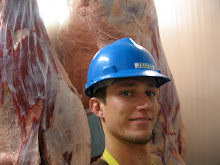 |
| 2005 Harvest |
I get that question periodically. So... here's the version straight from the source.
We all know that organic certification requires that all organic growers plant organic planting stock or organic seed when commercially available. Here they are:
NOP 205.204 (a) The producer must use organically grown seeds, annual seedlings and planting stock: Except, That (1) Nonorganically produced, untreated seeds and planting stock may be used to produce an organic crop when an equivalent organically produced variety is not commercially available… “
NOP 205.2 Commercially Available: The ability to obtain a production input in an appropriate form, quality or quantity to fulfill an essential function in a system of organic production or handling, as determined by the certifying agent in the course of reviewing the organic plan”.
I was the sole source of organic strawberry planting stock in the United States in the planting years of 2005, 2006, 2007, 2008 & 2009. For these five years, I literally gave plants away to establish my name and reputation in this business. I was establishing some great long term working relationships with some great people and life was good. My product was of such high quality my plants were literally selling themselves- if I could get a box or two of plants planted on an organic farm those people would be my customers for life.
 |
| 2009 Organic Strawberry Nursery |
2009 was my
fifth year of organic strawberry plant production. Anyone who grew organic strawberries (specifically in CA) knew I existed. Word in the furrow was that the main certifiers weren't properly enforcing the "if available" rule, as many growers were still using conventional plants when clearly the organic plants were commercially available at similar prices and all the main varieties.
In 2009 I had eight acres of organic strawberry nursery plants, harvested them and sold the crowns in the fall of 2009 and dormant crowns in early 2010. I produced nearly two million plants with eight different varieties. I wasn't getting the sales this year like I had in the past... I had done two different harvests of different varieties to offer the best varieties at all times throughout the planting season. I pretty much did everything I could do on my end to provide high quality, low cost organic planting stock to the organic strawberry industry at all times in the optimal planting window. Unfortunately I was not supported by the majority of my fellow organic growers.
 |
| 2009 Harvest |
An organic strawberry grower in Watsonville, Stephen Pederson at Two Small Farms wrote an article that is pretty descriptive for his CSA. It is from an organic strawberry grower's perspective, completely unsolicited on my part and quite entertaining for me to read.
http://www.twosmallfarms.com/Newsletters.pdf/2010/TSF%20Newsletter%20April%207%202010.pdf
He hit the nail pretty hard on the head. Growers weren't being enforced because the vertically integrated companies were using conventional plants on the majority (if not all) of their organic fields.
 |
| Swanton Berry Farms freshly-planted field with Prather Ranch nursery plants |
My 2009 crop year was devastating for me. I grew nearly two million plants and had to throw away hundreds of thousands of plants that sat in cold storage in Watsonville and in Redding. If it weren't for the plants I sold as conventional it would have been a total flop. Yes, you heard that right... my plants were boxed up as conventional plants and they sold much better than if they were marketed as organic plants.
I did not plant my nursery in 2010. Ironically, I won the IPM Innovator Award by the California Department of Pesticide Regulation in March of 2010, right as I was shipping the last of my plants out. Bittersweet to say the least.
One day I was contacted by an investigative reporter who was going to write an article for the New York Times. It pretty well speaks for itself.
http://www.nytimes.com/2011/09/23/us/farmers-seek-to-raise-standards-for-berries.html?_r=1&ref=sanfranciscobayarea
This made some waves in the industry. I soon was on NPR marketplace, on Mother Earth News, Grist, and a bunch of other industry publications. I did have some interesting conversations after these articles. I'm still not convinced the industry fully supports me. Why waste my time and energy if the industry does not fully want it?
So that's where I am... working on some beautiful ranches, I've got some great projects in the hopper and life is grand. Will I ever grow organic plants again? I'm afraid that isn't up for me to decide... it's up to the organic industry.









